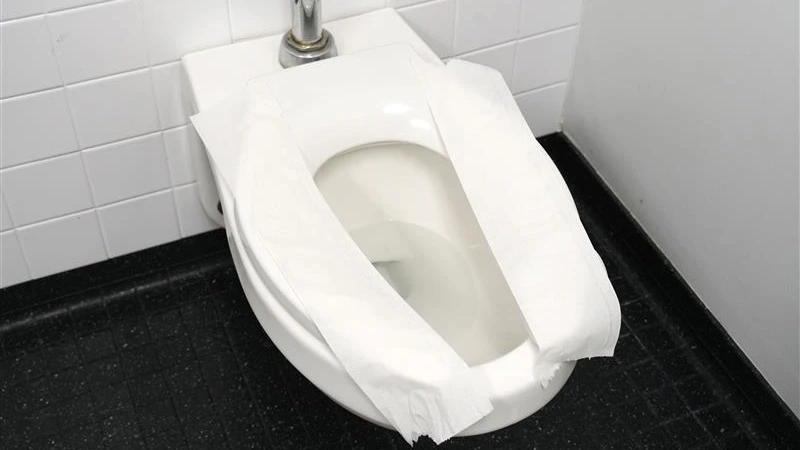Copyright abc

Most of us have been in a public toilet that makes us think twice about using it. Even when the space looks clean, you may still wonder if there's a risk sitting bare bum where many others have. Public toilets are a "microbial soup", according to Lotti Tajouri, an associate professor in molecular biology and genomics at Bond University and Murdoch University. But perhaps surprisingly, the toilet seat isn't the dirtiest part. And while using public bathrooms is generally low risk for healthy people, there are things you should be doing to protect yourself — including not taking out your mobile phone and never hovering over the seat. What germs are in public toilets? There are numerous microbes found on toilet seats and surrounding areas, says Dr Tajouri, including bacteria from the gut such as E. coli. Viruses such as norovirus and rotavirus, which can cause gastroenteritis (vomiting and diarrhoea), can also be found, he says. Then there are bacteria from the skin, for example Staphylococcus aureus, which can cause infections. Eggs from parasites can also be carried in poo. Biofilm, a mix of germs that builds up under toilet rims and on surfaces, is also common. Where do the germs live and how do we contract them? You might have thought germs would mostly reside on the toilet seat, but that's not the case, Dr Tajouri explains. A recent study found public toilet seats often have fewer microbes than the door handles, tap knobs and toilet flush levers. This is because those parts are often touched with unwashed hands, says Dr Tajouri. "When you dry your hands, that is another way to get extremely contaminated," he says, because if they haven't been washed properly, you are blowing germs around. Even when your hands are clean, Dr Tajouri says there may be germs in the water from previous users that can spread. He says another big problem in public toilets is flushing without closing the lid (if there even is a lid to close). These droplets can contain bacteria and viruses from the toilet bowl and travel up to 2 metres. Sotiris Vardoulakis, director of Healthy Environments and Lives National Research Network at the University of Canberra, says the main risk of transmission is the faecal-oral route. This is when pathogens from an infected person's faeces enter another person's mouth, usually because someone hasn't washed their hands properly. His research, conducted during the pandemic, found open-lid toilet flushing, ineffective handwashing or hand drying, substandard or infrequent surface cleaning, blocked drains and uncovered rubbish bins can result in widespread bacterial and or viral contamination in washrooms. However, they found no evidence of airborne transmission of respiratory pathogens, including COVID-19, in public washrooms. Put away your mobile phone Dr Tajouri says mobile phones are "Trojan horses" for carrying germs. His research involving 26 mobile phones found 11,163 organisms (5,714 bacteria, 675 fungi, 93 protists, 228 viruses, 4,453 bacteriophages) on their surfaces. In a survey Dr Tajouri conducted, 80 per cent of people admitted to using a mobile phone in a public toilet. "Even in a healthcare setting, in Australia, 52 per cent of workers admit to using a mobile phone in the toilet." He says mobile phones "negate" handwashing. "If your mobile is soiled, you can wash your hands as many times as you want, but you cross-contaminate your hands all over again. "The mobile phone is the perfect vector to transmit toilet-derived contaminations to the whole of the community." Minimising your risk If you can avoid bathrooms which are not well-maintained or cleaned regularly, that is your first line of defence, says Professor Vardoulakis. "In well-functioning and well-maintained public bathrooms, the risk of transmission should be minimal." Dr Tajouri says signs a toilet hasn't been cleaned include the smell of urine, soiled floors and what is obvious to your eyes. In some shopping centres, for example, there may be a log on the back of the door showing when the bathrooms were last cleaned. "However, in between each clean, you have dozens or hundreds of people passing through," Dr Tajouri says. He says it's always a good idea to line the toilet seat with specially designed sheets or toilet paper. His preferred method is using disinfectant wipes on the seat. He also uses disinfectant wipes to clean the door handle and the taps. Dr Tajouri says "never hover" over the toilet seat. "If you hover, you are going to contribute to the splash of your own body fluids." Most importantly, wash your hands thoroughly with soap and water, avoid use of the hand dryer if you can, and take hand sanitiser. Dr Tajouri recommends drying your hands with paper towel if there is some available, or carrying your own with you. And leave the mobile phone out of the bathroom and close the toilet lid — if there is one — before flushing. "All of this is the advice for someone who is immunocompetent. For those immunocompromised, it's extra important not to be surprised with any infections later," Dr Tajouri says.



